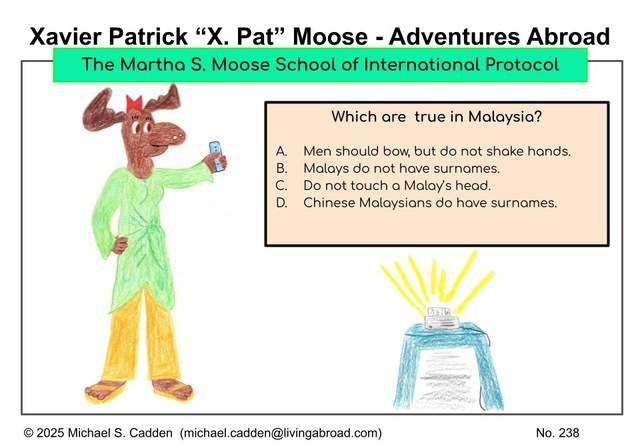

Answers: B, C, and D are true.
Greetings, titles and names
Because status is important in Malaysia, it is desirable to follow the proper protocol for greetings, titles, and names.
Greetings
Men shake hands or greet with a slight bow or nod of the head. Handshakes may be the western-style single-hand, or the double-hand salam. The grip of the handshake is usually fairly soft; Malays then swing their hands to their chests to indicate that the handshake was "from the heart." It is polite to do the same. Shake hands again upon leaving.
Strict Muslims and some Hindus do not shake hands with the opposite sex. Take your cue from your colleagues. Women should greet Malaysian men with a nod of the head and a smile unless a hand is extended first. Nod or give a slight bow and offer verbal greetings to women and elders. Always introduce higher-ranking and older people first, and women before men.
Aside from the handshake, you should avoid any unnecessary physical contact in the early stages of a relationship with a Malaysian; Malaysians reserve such intimacies for family and good friends. Also, never touch anyone's head, not even a child's, as it is considered the seat of the soul.
In business, after the initial greeting, offer your business card to everyone present, using both hands.
Verbal greetings vary depending on the ethnic origin of the person you are meeting. Malays may say "Salamat pagi" (Good morning), "Apa Khabar?" (How are you?) or simply "Halo" (Hello). Muslims often say "Asaalam alaykum" (Peace be upon you) in a formal setting. Chinese may greet with "Tze pau le ma?"(Have you eaten?) or "Ni hau ma?" (Are you feeling well?)
Titles
Status and hierarchy - their own and yours - are extremely important to Malaysians. You will want to use the correct title when addressing a Malaysian, particularly in a business setting. Important titles in Malaysia are:
- Tuanku, also spelled Tunku and Tengku, indicates hereditary royalty
- Tun denotes membership in a high order of chivalry
- Tan Sri and Datuk, or Datuk Seri or Dato, signify knighthood
- Tuan or Encik is Mr., Puan is Mrs., and Cik is Miss
Your business card, which should be distributed to all, must state your exact title and position in the organization you represent. In Malaysia, some corporate designations such as "chairman" imply only a figurehead.
Names
When you are being introduced to a Malaysian, take time to understand the correct pronunciation of the name, asking for the person to repeat it if necessary. In business, be sure to obtain the person's title or rank in the organization.
Malays technically do not have surnames, but instead are the "son of ..."; therefore, use the first name plus the title when addressing someone. For example, Ahmad bin Abdullah is Ahmad, son of Abdullah, and would be called Mr./Dr./Professor Ahmad, never Mr. Abdullah. Married Malay women will not have the same last name as their husbands. Fatimah binte Ali is Fatimah, daughter of Ali, and, therefore is addressed as Miss/Mrs./Dr. Fatimah.
Chinese, on the other hand, do have surnames or family names, which are given first. Thus, when addressing a Chinese person, use his or her title and the first name that you hear, e.g., Mr. Tan's full name is Tan Cho Wong. Chinese women retain their maiden names, so again, husband and wife would not share the same last name.
Indians also do not traditionally have family names; however, some have now adopted a family name that all members use. Generally, Indians will use their father's first initial followed by their own first name and should be addressed as Mr. or Miss plus the first name, never including the initial. A married Indian woman will drop her father's initial and become "Mrs." plus her first name followed by her husband's last name.
Excerpted from Living Abroad's Malaysia Report: Social customs/Greetings, titles and names
Written by Michael Cadden, SGMS-T, VP International Operations
